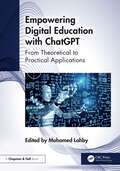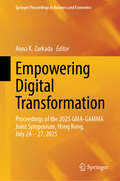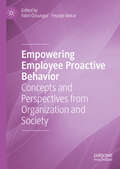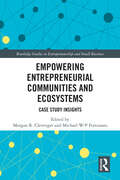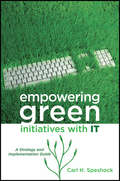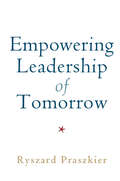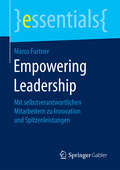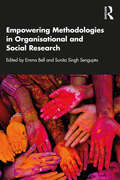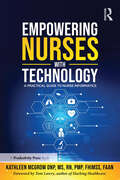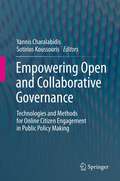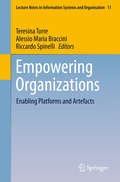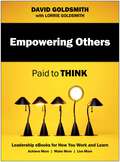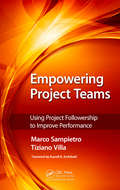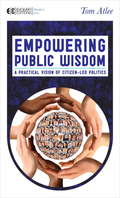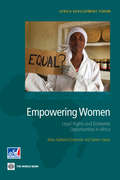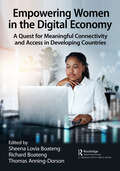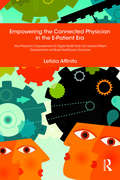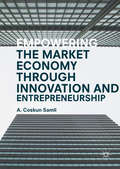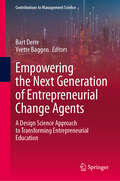- Table View
- List View
Empowering Customers with Mobile Applications: How To Boost Your Company's Image Using Social Technologies
by Josh Bernoff Ted SchadlerIncreasingly, your customers are turning to their mobile devices to find information about your company's products and services-and they expect you to be there to help them. You have a choice to make: You can align yourself with these customers, empowering them with mobile offers, mobile information, and mobile customer service, or you can let them find whatever happens to come their way via the Internet. Mobile web users-the "mass mavens" who spend their time in content channels-have even more influence than your other connected customers. If you empower these people with information, they'll blog or tweet about how great your company is. If you don't, they'll broadcast the fact that you don't have a clue. In this chapter, authors Josh Bernoff-coauthor of "Groundswell"-and Ted Schadler explain how you can harness the marketing power of your customers. Through real-life examples from E*TRADE, the Philadelphia Eagles, and UPS, you'll learn what the authors call the POST method for building mobile applications: People, Objectives, Strategy, and Technology-and how you can satisfy your customers' need for information and reach out to them through social media. This chapter was originally published as Chapter 5 of Empowered: Unleash Your Employees, Energize Your Customers, and Transform Your Business
Empowering Digital Education with ChatGPT: From Theoretical to Practical Applications
by Mohamed LahbyRecently, there has been a significant increase in the development and interest in applying generative AI across various domains, including education. The emergence of large language models (LLMs), such as the ChatGPT tool, fueled by advancements in generative AI, is profoundly reshaping education. The use of the ChatGPT tool offers personalized support, improves accessibility, and introduces innovative methods for students and educators to engage with information and learning materials. Furthermore, ChatGPT facilitates a wide range of language learning services, including language instruction, speech recognition, pronunciation feedback, and immersive virtual simulations for hands-on learning experiences.This book explores the transformative potential of the ChatGPT tool within education, shedding light on the opportunities that arise through the integration of the ChatGPT tool into various aspects of the learning process. It serves as a platform for the community to share cutting-edge research ideas concerning the use of the ChatGPT tool in digital education. Readers will discover how the ChatGPT tool can enhance student engagement, foster personalized learning experiences, facilitate intelligent tutoring systems, support virtual classroom interactions, and revolutionize assessment and feedback mechanisms.
Empowering Digital Transformation: Proceedings of the 2025 GMA-GAMMA Joint Symposium, Hong Kong, July 24–27, 2025 (Springer Proceedings in Business and Economics)
by Anna K. ZarkadaThis book contains selected papers from the 2025 Greek Marketing Academy and the Global Alliance of Marketing and Management Associations Joint Symposium (GMA-GAMMA2025) held from July 24 to 27, 2025, in Hong Kong, China.It focuses on achieving a human-centered digital transformation by empowering people and integrating processes and platforms to foster sustainable prosperity for all. It challenges conventional thinking by offering novel conceptualizations, empirical evidence, and case studies from regions at various stages of digitalization and across different product, market, and industry contexts.The book aims to equip decision-makers and academics with the tools to navigate the increasingly blurred boundaries between humans and computers, businesses, institutions, and society, and the traditional, platform, attention, and experience economies. The chapters span operations, marketing, and management and bring together a variety of country context and industries undergoing digital transformation.
Empowering Employee Proactive Behavior: Concepts and Perspectives from Organization and Society
by Fahri Özsungur Fevziye BekarProactive employee behaviour refers to the attempt to improve existing conditions in the workplace or create new ones, as well as actions to change one’s work environment, interpersonal relationships and socialisation behaviour instead of passively adapting to it. This contributed volume explores the role of proactive behaviour in employer/employee relations and in the wider context of the organization and society. It includes a comprehensive section that aims to provide a broad and descriptive perspective on the concepts of proactive behaviour and the research landscape. It examines areas including mental health, emotional management, disadvantaged employees, gender and queer-based perspectives, changes and conflict, sustainability, and non-profit organizations. Although proactive behavior is a desired behavior in business life, individuals who exhibit proactive behavior in the workplace can experience difficulties. For this reason, blind spots and hurdles that surround proactive behavior are also explored in this book. Examined in the light of current events, trends and the latest research, this book is intended to be a comprehensive guide on the positive and negative organizational behavior issues associated with proactive behavior. It will be of great interest to academics and students, as well as managers and all those with a wider interest in organizational behaviour.
Empowering Employees for Broad-Based Action: Overcoming Barriers to Organizational Change
by John P. KotterWith the right structure, training, systems, and supervisors to build on a well-communicated vision, increasing numbers of firms are finding that they can tap an enormous source of power to improve organizational performance-they can mobilize hundreds or thousands of people to help provide leadership to produce needed changes. This chapter was originally published as Chapter 7 of "Leading Change."
Empowering Entrepreneurial Communities and Ecosystems: Case Study Insights (Routledge Studies in Entrepreneurship and Small Business)
by Morgan R. Clevenger Michael W-P FortunatoEntrepreneurial Communities and Ecosystems: Case Study Insights aims to provide applied examples that embody the theories, principles, and processes that contribute to empowering everyday entrepreneurial communities and ecosystems. Relying on a diversity of narratives from a wide range of entrepreneurial communities, entrepreneurial ecosystems, and organizations, this book presents a collection of case studies that take the reader inside the minds of leaders who are working to empower entrepreneurs and build entrepreneurial ecosystems and entrepreneurial communities—sometimes from scratch. The book features research and stories from entrepreneurs, development agencies, entrepreneurial support and assistance organizations (i.e. feeders and supports), governments, and involved citizens and local leaders in their quest to make their communities more entrepreneuring. The book presents an analytic frame through which the case studies are cross-analyzed, providing "meta-guidelines" for pursuing a broad range of strategies for supporting local and regional entrepreneurial action. This research volume is equally useful as an undergraduate or graduate text on the sociology of entrepreneurs and entrepreneurship as it is a field guide for ecosystem builders, policy makers, nonprofits, and entrepreneurship and social researchers worldwide.
Empowering Exporters: Reciprocity, Delegation, and Collective Action in American Trade Policy
by Michael J. GilliganUntil the New Deal, most groups seeking protection from imports were successful in obtaining relief from Congress. In general the cost of paying the tariffs for consumers was less than the cost of mounting collective action to stop the tariffs. In 1934, with the passage of the Reciprocal Trade Agreements Act, all of this changed. The six decades that followed have produced a remarkable liberalization of trade policy in the United States. This occurred despite the fact that domestic politics, according to some of the best developed theories, should have prevented this liberalization. Michael Gilligan argues that liberalization has succeeded because it has been reciprocal with liberalization in other countries. Our trade barriers have been reduced as an explicit quid pro quo for reduction of trade barriers in other countries. Reciprocity, Gilligan argues, gives exporters the incentive to support free trade policies because it gives them a clear gain from free trade and thus enables the exporters to overcome collective action problems. The lobbying by exporters, balancing the interests of groups seeking protection, changes the preferences of political leaders in favor of more liberalization. Gilligan tests his theory in a detailed exploration of the history of American trade policy and in a quantitative analysis showing increases in the demand for liberalization as the result of reciprocity in trade legislation from 1890 to the present. This book should appeal to political scientists, economists, and those who want to understand the political underpinnings of American trade policy. Michael J. Gilligan is Assistant Professor of Politics, New York University.
Empowering Green Initiatives with IT
by Carl H. SpeshockA straightforward guide to the role of IT departments and vendor's in assisting organizations in going green with the aid of IT-related resources and offerings.This book provides organizations with strategy, planning, implementation, assessment guidance for their Green initiatives. It discusses the many benefits of Green initiatives with the assistance, integration and collaboration of IT department and vendors, i.e. custom and vendor application development and reporting tools, Green IT examples, business intelligence dashboards that can perform analytical and predictive analysis of green related business data.Outlines the major benefits to be gained through Green initiatives with ITShows you how your business can strategize, plan, implement, assess Green initiatives solutions with ITExplores how to develop Green initiative strategies, plans, projects, and assessments that integrate IT resources and offerings effectively.Practical and thorough, this book includes helpful checklists, glossary, and resources to get started with your business's Green initiatives.
Empowering Leadership of Tomorrow
by Ryszard PraszkierEmpowering Leadership of Tomorrow examines leadership that enables and empowers others to co-participate, co-create, and experience the joy of creativity. It proposes a kind of leadership that fosters bottom-up dynamics, empowering people, groups, teams, and societies. Praszkier shows how this approach, called Empowering Leadership (EL), can drive success in business and, in the case of social entrepreneurship, have an immense social impact. Furthermore, he shows that EL style is also beneficial in other fields, such as parenting and counseling. The book presents diverse case studies from business and social arenas, as well as from family life. It establishes practical guidelines for leadership development, including methods to enhance creativity, and also casts an eye toward the future, demonstrating approaches to navigating future scenarios in a complex and unpredictable environment.
Empowering Leadership: Mit selbstverantwortlichen Mitarbeitern zu Innovation und Spitzenleistungen (essentials)
by Marco FurtnerMarco Furtner gibt in diesem essential eine verst#65533;ndliche Einf#65533;hrung in die sehr aktuelle F#65533;hrungskonzeption Empowering Leadership. Der Autor zeigt au#65533;erdem die Zusammenh#65533;nge der F#65533;hrungskonzept-Triade Empowering Leadership, Self-Leadership und Shared Leadership auf. Eine erm#65533;chtigende F#65533;hrungskraft agiert in der Rolle eines Coaches. Sie gew#65533;hrt einen hohen Grad an Autonomie und f#65533;rdert die Selbstentwicklung der Gef#65533;hrten. Empowering Leadership zielt darauf ab, alle Organisationsmitglieder am F#65533;hrungsprozess zu beteiligen. M#65533;chten Organisationen und Teams ihre Kreativit#65533;t, Innovationsf#65533;higkeit und Spitzenleistungen nachhaltig steigern, dann stellt Empowering Leadership in Interaktion mit Self-Leadership und Shared Leadership das F#65533;hrungsverhalten der Wahl dar.
Empowering Marketing and Sales with HubSpot: Take your business to a new level with HubSpot's inbound marketing, SEO, analytics, and sales tools
by Resa GoodingLeverage HubSpot to reach your target audience with the right content and convert them into loyal customersKey FeaturesExplore a full software stack for marketing, sales, and customer services to grow your businessUnderstand how to organize, track, and build better relationships with leads and customersLearn to prioritize and execute your marketing tasks in an efficient wayBook DescriptionEmpowering Marketing and Sales with HubSpot is your comprehensive solution to using HubSpot to achieve your business goals with a flexible and lean approach. With this book, you'll implement out-of-the-box solutions provided by HubSpot for sales and marketing professionals using all the tools needed to effectively manage your business campaigns, sales, and marketing automation processes.This book will take you through steps to ensure your investment in HubSpot pays off from Day 1. You'll learn how to set up HubSpot correctly and understand how to generate quick wins for your organization. Next, you will work with important HubSpot tools for SEO, social media, and ads. The book will also show you how to use HubSpot for conversational marketing and create a marketing funnel using HubSpot's lead capture and engagement tools. In addition to this, you will get to grips with building custom reports, dashboards, and notifications to stay on top of company marketing goals. Later, you will learn how to use HubSpot for inbound marketing and for every type of business, such as manufacturing, agriculture, and eCommerce.By the end of this HubSpot book, you will have the skills you need to be able to set up effective marketing campaigns and leverage the insights gleaned from sales efforts using just one platform.What you will learnExplore essential steps involved in implementing HubSpot correctlyBuild ideal marketing and sales campaigns for your organizationManage your sales process and empower your sales teams using HubSpotGet buy-in from your management and colleagues by setting up useful reportsUse Flywheel strategies to increase sales for your businessApply the inbound methodology to scale your marketingRe-engage your existing database using the HubSpot retargeting ads toolUnderstand how to use HubSpot for any B2B industry in which you operateWho this book is forThis HubSpot marketing book is for sales and marketing professionals, business owners, and entrepreneurs who want to use HubSpot for scaling their sales and marketing activities. A basic understanding of key marketing terms is required to get started with this book.
Empowering Methodologies in Organisational and Social Research
by Emma Bell Sunita Singh SenguptaThis book explores the meaning and practice of empowering methodologies in organisational and social research. In a context of global academic precarity, this volume explores why empowering research is urgently needed. It discusses the situatedness of knowing and knowledge in the context of core-periphery relations between the global North and South. The book considers the sensory, affective, embodied practice of empowering research, which involves listening, seeing, moving and feeling, to facilitate a more diverse, creative and crafty repertoire of research possibilities. The essays in this volume examine crucial themes including: · How to decolonise management knowledge · Using imaginative, visual and sensory methods · Memory and space in empowering research · Empowerment and feminist methodologies · The role of reflexivity in empowering research By bringing postcolonial perspectives from India, the volume aims to revitalise management and organisation studies for global readers. This book will be useful for scholars and researchers of management studies, organisational behaviour, research methodology, development studies, social sciences in general and gender studies and sociology.
Empowering Nurses with Technology: A Practical Guide to Nurse Informatics
by Kathleen McGrowNursing informatics is the specialty that integrates nursing science with multiple information management and analytical sciences to identify, define, manage, and communicate data, information, knowledge, and wisdom in nursing practice. It allows nurses to deliver evidence-based and patient-centered care, improve human health, and advance medical research. It also enhances clinical workflows so that nurses and other personnel can care for patients more efficiently and effectively.Some of the benefits of nursing informatics include a reduction in medical errors, lowered costs, improved nurse productivity, and better care coordination among nurses, physicians, pharmacists, and others throughout various care stages. Empowering Nurses with Technology: A Practical Guide to Nurse Informatics is a comprehensive guidebook for nurses and healthcare professionals looking to understand the role of technology in modern nursing practices. This book covers the basics of healthcare technology, including electronic health records (EHRs), telehealth, and mobile health applications. This book offers practical advice for implementing technology in nursing workflows, as well as strategies for training and engaging nursing staff in the use of new technology. It also explores the impact of technology on patient care and outcomes, discussing topics such as patient safety, privacy, and data security.This book provides a useful resource for nurses seeking to leverage technology to improve the quality and efficiency of their care while also enhancing their professional development and job satisfaction.
Empowering Open and Collaborative Governance: Technologies and Methods for Online Citizen Engagement in Public Policy Making
by Yannis Charalabidis Sotirios KoussourisThe use of information and communication technologies to support public administrations, governments and decision makers has been recorded for more than 20 years and dubbed e-Government. Moving towards open governance roadmaps worldwide, electronic participation and citizen engagement stand out as a new domain, important both for decision makers and citizens; and over the last decade, there have been a variety of related pilot projects and innovative approaches. With contributions from leading researchers, Charalabidis and Koussouris provide the latest research findings such as theoretical foundations, principles, methodologies, architectures, technical frameworks, cases and lessons learnt within the domain of open, collaborative governance and online citizen engagement. The book is divided into three sections: Section one, "Public Policy Debate Foundations," lays the foundations regarding processes and methods for scoping, planning, evaluating and transforming citizen engagement. The second section, "Information and Communication Technologies for Citizen Participation," details practical approaches to designing and creating collaborative governance infrastructures and citizen participation for businesses and administrations. Lastly, the third section on "Future Research Directions of Open, Collaborative ICT-enabled Governance" provides a constructive critique of the developments in the past and presents prospects regarding future challenges and research directions. The book is mainly written for academic researchers and graduate students working in the computer, social, political and management sciences. Its audience includes researchers and practitioners in e-Governance, public administration officials, policy and decision makers at the local, national and international level engaged in the design and creation of policies and services, and ICT professionals engaged in e-Governance and policy modelling projects and solutions.
Empowering Organizations
by Teresina Torre Alessio Maria Braccini Riccardo SpinelliThis book presents a collection of original research papers focusing on the enabling aspects of Information and Communication Technologies. In particular, it focuses on the two topics of digital platforms and digital artefacts, and discusses their role in enabling organizations to achieve specific goals, to exploit innovative value propositions, or to leverage innovative coordination mechanisms. Adopting a multidisciplinary perspective on a variety of information systems topics, the book offers interesting insights for IS managers, business managers, and policymakers alike. It is based on a selection of the best research papers - original double-blind peer-reviewed contributions - presented at the annual conference of the Italian chapter of the AIS, held in Genoa (Italy) in November 2014.
Empowering Others: Paid to Think
by David GoldsmithThe reality is you can't do everything on your own; you need other people to achieve results. Without realizing it, most leaders are the cause of underperformance and low productivity within their organizations despite their experience and intentions to have the opposite effect. Now, learn the step-by-step methodology and your exact role in the empowerment process that will ready your people to handle the authority and responsibilities you transfer to them.
Empowering Project Teams: Using Project Followership to Improve Performance
by Tiziano Villa Marco SampietroExamining the project environment from the perspective of project team members, this book re-interprets project management methodologies and behaviors using a bottom-up approach. It explores the application of project followership in the key stages of project management and details the methods and techniques that all project team members need to know. Outlining the behaviors team members should adopt for project success, the text considers project closure and transfer and explains why this is an ideal time to evaluate if efforts invested have been rewarded.
Empowering Public Wisdom
by Tom AtleeLifelong activist Tom Atlee proposes innovative ways to distill the wisdom of ordinary people in order to better guide public policy. In Empowering Public Wisdom, Atlee recognizes currently popular forms of progressive democracy advocates, such as citizen participation and voter education, but suggests that what is really needed is a re-thinking of the very concept of democracy; Atlee advocates the use of "public wisdom," a collective intelligence that can be drawn upon to guide public policy and action. Reaching beyond partisan politics, Atlee explores how a diversity of views can be engaged around public issues in ways that generate a coherent, shared "voice of the people" that takes most or all of the population's perspectives and needs into account. Atlee's core approach is through "citizen deliberative councils," in which a small group of people randomly selected creates a "mini-public" or a microcosm of the larger population. Citizen councils engage in the study of a public issue and make recommendations to public officials and the community, but disband afterward; when a new issue arises, a new council is formed. Ultimately, Atlee aims even higher, suggesting a possible fourth branch of government to better balance our current democratic system. Combining a radical vision with practical solutions, Empowering Public Wisdom provides a unique and refreshing voice in the political arena.Empowering Public Wisdom is part of the EVOLVER EDITIONS Manifesto Series.From the Trade Paperback edition. on co-intelligence holds some of the keys to enabling us to work with the ever-more complex opportunities in human existence." -- Robert Theobald, author of Turning the Century and The Rapids of Change"Tom Atlee is a unique soul who is fostering the awakening of our collective wisdom."-- Duane Elgin, author of Voluntary Simplicity and Promise Ahead"Tom Atlee's work is an important contribution to the world I want to create." -- Stewart Levine, Esq, author of Getting to Resolution and The Book of Agreement
Empowering SME Managers in Palestine
by Farhad Analoui Mohammed Al-MadhounSMEs create employment, wealth and a potential for future growth. In Palestine they can also mean survival and freedom. In Palestine they are not a choice but a necessity for sustainable development. But by their nature SMEs are vulnerable in a business environment characterized by uncertainty. To give the managers of SMEs in Palestine a realistic chance of success they need training to enable them to meet the challenge of running their enterprises effectively. Drawing on original research undertaken within Palestine this book explores how the challenge is being met (and considers how it might be even more successfully met) by enabling and empowering the owners and managers of these pioneering businesses.
Empowering Women
by Mary Hallward-Driemeier Tazeen HasanThe importance of property rights in providing the incentive to invest, work hard, and innovate has been recognized for centuries. Yet, many women in Africa do not have the same property rights or formal legal capacity enjoyed by men. Empowering Women: Legal Rights and Economic Opportunities in Africa documents the extent to which the legal capacity and property rights vary for women and men, and analyzes the impact this has on women's economic opportunities. The book introduces the "Women's Legal Economic Empowerment Database - Africa (Women LEED Africa). " This database covers all 47 countries in Sub-Saharan Africa, providing indicators and links to constitutions, ratified international conventions, and domestic statutes where there are gender gaps in legal capacity and property rights. It shows how and where, despite universal constitutional recognition of non-discrimination, many countries have exceptions in areas of marriage, ownership, and control over property and inheritance. With less secure property rights, women in these countries do not have the same ability - or incentive - to accumulate and control assets and thus to access finance or to grow their businesses. After laying out the various gender gaps in legal capacity and property rights, the book addresses the additional challenges stemming from legal systems with a multiplicity of sources of law. Overlapping legal systems themselves add uncertainty to defining women's economic rights. The authors use case law to trace out the implications for women's rights and to provide examples of effective reforms. The book recognizes that beyond de jure differences, women may face greater practical constraints in having their rights protected. This book spells out specific steps that can be taken to address gender gaps both in formal property rights and in practical constraints in accessing justice.
Empowering Women in Work in Developing Countries
by Maarten Van Klaveren Kea TijdensPresents the outcomes of a major 14-country project aimed at empowering girls and young women. Provides a discussion of their choices in life, comparing factors such as family background, health, education, employment opportunities and the use of and access to the internet.
Empowering Women in the Digital Economy: A Quest for Meaningful Connectivity and Access in Developing Countries
by Richard Boateng Thomas Anning-Dorson Sheena Lovia BoatengThis book presents multidisciplinary perspectives on opportunities and best practices necessary for empowering women in the digital economy in developing countries. The book explores the components of connectivity that matter most to women. It also helps decision-makers and policymakers to adopt the policies needed to empower women in using digital platforms and developing (and taking up) careers in the digital economy in developing economies. In response, we gathered eight contributions (or chapters) on new directions, strategies, and barriers to women’s empowerment through digital technologies. The contributions span thematic areas such as female digital entrepreneurship, social media, and agricultural value chains, women in the gig economy, the digital divide, gender disparities in cryptocurrencies, and digital access in agriculture. In précis, the contributions argue that, first, appropriate legislation matters, but it is not enough – there is a need to alter social and cultural attitudes and raise awareness. Second, there is a need to address affordability. Government and development agencies may begin by offering free or discounted smart devices to rural women and appropriate digital skills training relevant to their economic activities. Third, there is a need for urgent attention by government labor agencies in developing countries to enforce decent working conditions and protection for female gig workers while maximizing opportunities being offered through these platforms. Don’t just leave women to use digital platforms and services; support them with sound policies and programs for responsible and sustainable use. In effect, this book offers clarity on new strategies, case studies/examples, and lessons in addressing or circumventing institutional challenges to women’s empowerment through digital technologies.
Empowering the Connected Physician in the E-Patient Era: How Physician’s Empowerment On Digital Health Tools Can Improve Patient Empowerment and Boost Health(care) Outcomes
by Letizia AffinitoThe constantly evolving digital world must be used in the practice of medicine to improve the care of patients. However, the only way to do so effectively is via evidence-based, meaningful and strategic use. Empowering the Connected Physician in the E-Patient Era provides practical guidance in this mission and is thus essential reading for all health stakeholders looking into approaching this. Drawing on the author’s research and consulting practice, as well as on the practical experience of managers in medium-large organizations worldwide, the book will provide a proven framework to improve the development and implementation of physicians’ empowering digital programs in these organizations, a step-by-step guide for how companies can develop and implement programs aiming at empowering physicians while empowering patients. It is an engaging how-to/how-not-to book which will include tips, advice and critical reviews that every stakeholder must have in order to participate in the evolving healthcare system and be more active in making strategic patient-centered choices. This book will help healthcare organizations chart a course within this new territory and thereby improve their ability to engage with empowered patients.
Empowering the Market Economy through Innovation and Entrepreneurship
by A. Coskun SamliThis book argues that the strength of our dynamic society is a market economy, which functions well only if positive and constructive marketing practices are performed. It offers innovative alternatives for achieving economic progress and outlines strategies to create conditions for equal opportunity. The American economy has transitioned from a "survival of the fittest" to "survival of the fattest" mentality, focusing less on the people and quality of life and more on the amount of dollars to be gained. The divide between the 1% and 99% leaves lower-income individuals at a significant disadvantage and threatens both economic and societal advancement. The author offers clear, intelligible solutions to accomplish this such as eliminating discrimination, providing opportunities for new ideas and industries, enhancing quality of life, and encouraging more competition so that radical innovations can emerge and make a positive difference. This book will appeal to leaders and researchers across marketing, economics, management, and accounting looking for answers on how to get the American economy back on track.
Empowering the Next Generation of Entrepreneurial Change Agents: A Design Science Approach to Transforming Entrepreneurial Education (Contributions to Management Science)
by Bart Derre Yvette BaggenIn an era defined by volatility, complexity, and uncertainty, educating future-oriented change agents is essential to address pressing societal challenges such as climate change and the transition to a circular economy. These change agents play a pivotal role in driving societal transformation, requiring a mindset and skills suited to navigating complex problems and adapting to environments full of uncertainty. Entrepreneurial education emerges as a critical lever in fostering such capabilities, integrating seamlessly into higher education and lifelong learning contexts to prepare change agents for active, constructive participation in societal transitions. This book introduces a design-science research approach to entrepreneurial education, emphasizing the design, implementation, and evaluation of educational practices tailored to diverse contexts. Real-life case studies illustrate how the design-science approach has been successfully applied, offering practical insights for educators and researchers aiming to enhance their own research and teaching practices. By connecting theory to practice, the design-science approach offers a fresh perspective on entrepreneurial education. It not only unpacks the mechanisms behind effective program design but also fosters innovation through continuous, data-driven cycles of collecting and processing feedback. This approach ultimately enables the development of evidence-based entrepreneurial education that prepares change agents capable of driving the necessary societal transformation across contexts.

